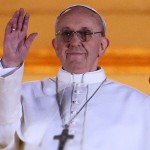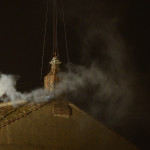The smoke clears to reveal a new continent

By Alan Oakley. The earth stood still for over an hour in Vatican City and, for some, all around the world as the election of a new pope, the first from outside Europe in over 1200 years, was heralded with ritual white smoke.
People sang and danced in front of the world’s media’s many cameras and mobile phone networks crashed as tens of thousands of people called friends and family.
Shouts of “Viva Il Papa” (long live the pope) filled the air, even if no-one yet knew who ‘Il Papa’ was to be.

Then the agonising, expectant wait in what, on any other occasion, would be considered miserable conditions. The white smoke from the Sistine Chapel acted as a virtual shelter from the incessant drizzle until the time to end all speculation arrived.
The tens of thousands huddled together in St Peter’s Square looked on as Argentine cardinal, Jorge Mario Bergoglio, a Jesuit, took the name Pope Francisco I (or Pope Francis I in English) in honour of St Francis of Assisi, founder of the Franciscan order of priests.
The announcement confounded many predictions that, of the South American contenders for the papacy, Odilo Scherer of Brazil, who was a front-runner in the 2005 conclave deliberations when Pope Benedict XVI was elected, would be most favoured. Others predicted that an African pope would be selected, even though the odds against early favourites Peter Turkson and Francis Arinze gradually increased since Pope Benedict stood down. Ghanaians and Nigerians of all religious persuasions are naturally disappointed, as perhaps are those of African heritage throughout the world, since an African pope would have proved even more of an endorsement than the election of Barack Obama as US president.
In truth, Africaphiles can have few grounds for real complaint this time around. Latin America has one of the world’s highest densities of Catholics, with a faith base more than 370 million-strong, over 80 per cent of the continent’s total population. The election of Pope Francis provides resolution to the long-standing question of when a Latino would be chosen to lead the church.
Early word on Pope Francis I is that he is conservative. He opposes same-sex marriage and abortion on social grounds even if his native Argentina was the first country to legalise gay marriage. Much has been made of his past visits to slums and his washing the feet of AIDS sufferers.
The pontiff’s choice of names is taken as a symbol of his humility; St Francis of Assisi had been a beggar in the 13th Century. Archbishop Jorge Mario Bergoglio was noted in Buenos Aries for eschewing the fruits of his high rank – preferring to travel by public transport and choosing a modest apartment over the luxury abode that was his right as Archbishop. First signs are that the 266th pontiff has no designs on abandoning his austere ways. After the conclave and his introduction to the baying hoards, he reportedly elected to travel back with his erstwhile brother cardinals rather than in a waiting limousine.
“In favour of Bergoglio is his pastoral attitude, as they say in the Church – his relationship with the people,” said Leandro Pastor, a friend of the new Pope for a quarter of a century who is philosophy professor at the University of Buenos Aires. “He’s a very simple man. He’s very austere. And also, I think he’s an intelligent man and someone who is very good at communicating.”
Few would dispute that Pope Francis I is inheriting a Church that is in crisis. Elements within the Catholic Church have called for a rethink of some basic tenets such as the celibacy of priests, the uniform ban on artificial contraception and even allowing women to be priests as in other Christian denominations.
The cover-up of child sexual abuse by paedophile priests has also cast a large shadow over the Church that the new pope will inherit. And in a reminder of the relentless pace of the scandal, new details emerged implicating one of the cardinals, Los Angeles Archbishop Roger Mahony, who is accused of protecting predator priests. Lawyers said on Tuesday that the archdiocese had agreed to pay nearly $10 million (750,000 euros) to four men who alleged they were molested by a former priest in the 1970s.
Prime Minister David Cameron was amongst the first of the world’s political leaders to congratulate Pope Francis. However, the thorny issue of the Falkland Islands could not have been far from his mind so soon after inhabitants voted overwhelmingly to remain British. As archbishop of Buenos Aries, the prelate famously called the British “usurpers” in the context of the Islands’ sovereignty.
Last year, Archbishop Bergoglio paid tribute to the 649 Argentine troops who died during the Falklands conflict, describing them as “sons of the homeland” who sought to “reclaim what is theirs”.
Giving mass at the Metropolitan Cathedral in Buenos Aires to coincide with the 30th anniversary of the conflict last April, he called for the vindication of “all” who died in the conflict, according to Argentine reports.
“We come to pray for those who have fallen, sons of the homeland who set out to defend his mother, the homeland, to claim the country that is theirs and they were usurped,” he told the congregation.
Francis I is the first pope from the Americas but not the first non-European to hold the position. The first ever pontiff, Peter, was born in the Golan Heights, while there have also been pontiffs from Libya and Turkey. The last non-European was Syrian-born Gregory III, elected in 731. The last pope to take a name that had not already been used was John Paul I. The last Italian pontiff had one of the shortest ever reigns, lasting just 33 days before he died on 26 August 1978. Before him you have to go back more than 1,000 years to find the next first-name pontiff, Lando, who was elected in 913.








